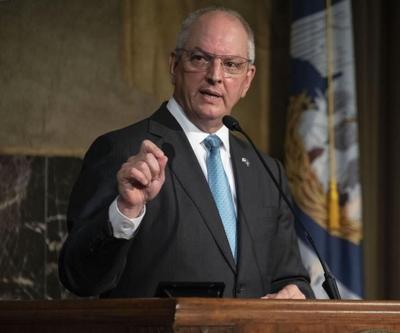Every legislative session seems to serve up a few lines that live in infamy. This past spring, one of them came from state Senate President Pro Tem Beth Mizell, R-Franklinton, who punctuated her skepticism about the coming of utility-scale solar farms by declaring “I thought we were an oil and gas state the whole time I've been here. Solar is over here, and if we’re choosing solar over oil and gas, nobody’s told me.”
Contrast that with a line that should get just as much play, this one from Gov. John Bel Edwards concerning the announcement of the state’s first carbon-capture project, a $4.5 billion clean-energy facility planned for Ascension Parish: “I think the risk quite frankly is not doing projects of this type in terms of the economy, because an energy transition is underway and we're powerless to stop it."
Maybe nobody explicitly told Mizell that the ground is already shifting, but Edwards is far from the only one who gets that Louisiana has two choices, to try to hold back the tide (around here we know how that generally works out) or to position itself to catch the wave.
Somewhat quietly, at least up against vocal objections of some Republicans at both the state and the congressional level, the revolution is coming to the state. Just consider a few recent headlines.
A San Francisco company pitched St. Helena Parish on a solar panel farm that could contribute energy to the utility grid, and parish officials said they’re open to the idea. There’s also a proposal to build a massive solar farm, a million panels strong, in Calcasieu Parish.
And without an interested buyer for its shuttered crude oil refinery in Convent — a sign of the times in itself — Royal Dutch Shell is exploring repurposing the facility to produce low-carbon fuels.
At the state level, Edwards has signed an executive order committing to reduce greenhouse gas emissions to net zero by 2050, launched a Climate Initiatives Task Force and joined a bipartisan coalition of governors working on state-led climate solutions. That puts his administration in line with President Joe Biden’s stated goals.
Also seeing a surge of interest is development of wind power in the Gulf of Mexico, which could be propelled by the state’s existing expertise in developing and servicing offshore oil and gas facilities.
Not all of these ideas are uncontroversial, even among those who understand the realities of the market and the environmental risk of sticking with the status quo.
Carbon capture, for instance, is viewed as promising by officials, both Republicans and Democrats, who want to stay in the fossil fuel business while also reducing carbon emissions. Among the proponents of this approach is Republican U.S. Sen. Bill Cassidy, who has introduced a bill to offer federal loans and aid to encourage development of these projects. Critics, though, worry about the environmental impact of storing the liquified carbon in caverns deep underground.
A hint of the looming discussion comes from the activist group Together Louisiana, which sent out a press release last week announcing that “an important debate is about to heat up on ‘carbon capture,’ and its outcome will affect Louisiana more than just about any other place.” The group encouraged its members to get informed by viewing an expert panel that the Governor's Climate Task Force is holding Tuesday.
All of these things sometimes feel as if they’re happening in a parallel universe to the one where some of our politicians still reside, a place where fighting climate change is considered extreme, supporting renewable projects amounts to bullying of people who work in oil and gas, and anything that might be included in the Green New Deal is automatically suspect.
In the world we all actually live in, as Edwards said so bluntly, the transition is here and Louisiana is powerless to stop it. For anyone who cares about the state’s economy and its survival in an age of sea-level rise and extreme weather linked to climate change, the real question boils down to this: Why on earth would they want to?
.



